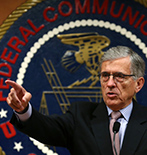
Bartlett D. Cleland is a research fellow with the Institute for Policy Innovation.
Cleland represented IPI as a member of the Internet Safety Technical Task Force and contributed to its final report, released in January 2009. The Task Force was created in February 2008 at the request of 49 state attorneys general to identify effective tools and technologies to keep kids safe online.
He currently serves as private sector co-chair of the American Legislative Exchange Council’s Telecommunications & Information Technology Task Force. Cleland also serves on the Internet Education Foundation Board of Directors, which involves working closely with the Internet Caucus and such projects as GetNetWise, a project to assist parents in understanding the Internet and how to protect children on-line.
Cleland began his professional career in the human resources field with Lee Hecht Harrison as a consultant for executive outplacement. He went to
The Creeping Tentacles of Unrestrained Regulation
We need restraint in the face of ill-defined, or ill-fitting, regulations that were clearly drafted and enacted in another age, for technology found today only in museums.
Why Republican Presidential Candidates Should Abandon Their VAT Tax Proposals
To introduce a hidden tax as part of a tax plan is a sure path to failure of transparency, and a failure to serve the citizens.
Playing Politics With Internet Taxes
Congress should move to protect taxpayers and Internet users once and for all by making the moratorium permanent.
Breaches and Breakdowns
Cyberattacks are a big and growing problem; fortunately, there are legislative ways to address the problem that will increase cooperation without stifling innovation.
Securing Our Rights Through ECPA Reform
James Madison, and George Mason before him, were clear in the language in the Fourth Amendment, that the people and anything they own must be protected from unreasonable and warrantless government searches and seizures. So why aren't we?
The Clouded Judgment of Tax Authorities
Revenue agencies will often seek to extend taxes well beyond what was contemplated when legislation was enacted, in the name of securing ever more money for government, even to the detriment of innovation.
The Clouded Judgment of Tax Authorities
Revenue agencies will often seek to extend taxes well beyond what was contemplated when legislation was enacted, in the name of securing ever more money for government, even to the detriment of innovation.
U.S. IT Competitiveness Prediction: Cloud-y With Government Interference
Congressional inaction, municipal tax action, and administration bad action make progress difficult for the U.S. cloud computing industry.
Congress Must Update ECPA to Protect Fundamental Rights
James Madison, and George Mason before him, were clear in the language in the Fourth Amendment, that the people and anything they own must be protected from unreasonable and warrantless government searches and seizures. So why aren't we?
The Federal Government Wants Even More of Your Personal Information
Given government's inability to protect sensitive personal information, public policy should move toward putting less, rather than more, taxpayer information in the hands of government.










